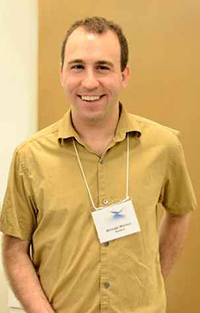Michael Maroun is a mathematical physicist who has also worked as a quantitative analyst, technical consultant, auditor, and professor throughout his professional career. Maroun participated in Wiki Education’s Spring Wiki Scientists course sponsored by the American Physical Society. His perspective on the connections between the research sciences, industry, and Wikipedia reflect the innumerable applications of the platform across disciplines.

“Wikipedia gives the unique opportunity for humanity to come together on topics relevant to all peoples and all cultures on the planet. The language of mathematics already transcends that of the vernacular language and culture, but the explanation and elucidation of mathematics requires delineation into the local vernacular to build understanding,” Maroun says.
From an industry perspective, Maroun spoke to the utility of Wikipedia, as a ubiquitous tool that is sometimes overlooked in professional spheres.
“I often found it astonishing as to the number of people working full time in, for example, a regulated industry that did not even know which federal executive department their regulating agency was a part of. Yet in front of them on their computers connected to the internet, is Wikipedia’s wonderfully interlinked ‘html-map’ of the US federal government,” Maroun says.
As far as his own contributions to Wikipedia are concerned, Maroun spelled out what he hopes to achieve as from his work on the platform.
“My general large scale hope for the sum total of my contributions to Wikipedia is that it helps experts separate fact from fiction,” Maroun says. “My research is to typically elucidate these two bodies of knowledge and show how the perceived inconvenient truths actually provide quite convenient opportunities, while the folklore more often than not ends up being false, or at best only conditionally true.”
Aside from confronting inconvenient truths within the sciences and minimizing fiction, or “folklore,” Maroun also endeavors to improve the accessibility of mathematics information. This goal is closely related to Maroun’s appreciation for open-data and his work as a researcher and educator.
“I hope to increase the average mathematical awareness of the human species. This is intimately related to open data. An array of numbers is a tool but knowing how to use it, and to use it responsibly is a completely different matter altogether,” Maroun says.
Transparent data collection is another aspect of Wikipedia that Maroun champions, as it fosters consensus and accuracy in the sciences.
“The integrity of the chain of custody of data is just as important as the free and open availability of the data. Freely available and open, but highly biased, numbers only damage society. Moreover, reliable high integrity data, which is misinterpreted, is equally damaging,” Maroun says.
Being someone who deeply values consensus in the sciences, Maroun believes that Wikipedia is the perfect platform to convene users in pursuit of this goal. The worldwide viewership on Wikipedia sets an unprecedented standard for communicating information — an opportunity that Maroun believes is too rare for other scientists to ignore.
“We as humans have a chance to retain facts nearly continuously and have any other human on earth contribute to it freely without fear of censorship for the first time ever. Scientists contributing to Wikipedia is a growing must for a fair and impartial record of the experiments and results each scientist struggles to attain for the whole of their career,” Maroun says.
Maroun attributes his Wikipedia knowledge to the instructional course experience provided by Wiki Education.
“In many ways I can say I could not consider myself, in good conscience, a Wikipedian without having taken the course. There were many things I thought I knew such as sources, which come naturally as a scientist, that were slightly different than I thought,” Maroun says.
Maroun’s experience with Wikipedia, guided by Wiki Education, continues to connect his interests in research and industry. His testimonial reinforces the notion that researchers, industry professionals, and educators all have plenty to gain from applying their knowledge to a platform like Wikipedia.
“The thought that, in theory, there could be thousands of other people double checking for/with me is exciting as a scientist and researcher that cares about error free (or as minimal as possible) processes. They say an extra pair of eyes helps. How about an extra ten thousand,” Maroun says.
To enroll in a course like the one Michael took, visit http://learn.wikiedu.org
Image of Michael Maroun Credit: MMmpds, CC BY-SA 4.0, via Wikimedia Commons
